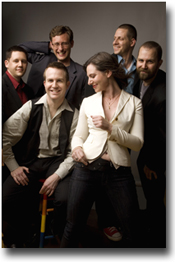
Eighth blackbird Premieres Daniel Kessner, Rzewski/Hoffman Improvise Expertly
Composer Daniel
Kessner was at a festival June 20 in the

Performing was the noted new music ensemble eighth blackbird.
Kessner, 62, who
took first prize in the Music08 /eighth blackbird Composition Contest over more
than 100 entrants, is professor emeritus at
Kessner’s “Harmonic Space” came as a bit of a mystery to concert attendees, with no program note or composer biography provided. Instead, eighth blackbird flutist Tim Munro read a brief description before the performance. “Microtonal, with the 7th and 11th partials stressed and his favorite interval, the 4th, divided into thirds and seconds . . .”
Opening work on Music08’s 11 concert of the week, it was not nearly as forbidding as that might sound. Ravishingly beautiful, is what I would call it, and I hope eighth blackbird repeats is again very soon (and often).
Also on the Friday night program was music by Frederic Rzewski and Music08 artistic director Joel Hoffman, including a truly remarkable duo piano improvisation by Rzewski and Hoffman, Music08 Music, Part II.
Kessner’s “Harmonic Space” (about 15 minutes) utilizes harmony and timbre to conjure a world separate and removed from our own. Microtones are employed in the context of harmonies stressing fourths and fifths, which give it a pronounced medieval sound.
Eighth blackbird violist Matthew Albert and cellist Nicholas Photinos played in harmonics only (lightly touching the string to produce the sound). The result was a curious blend of sonorities between the strings and the winds -- Munro on flute, Michael Maccaferri on clarinet -- producing ethereal quality that defied description. You would have to have heard it.
That it might have
a religious subtext was suggested by a liturgical sounding “invocation” by the
cello at one point. And percussionist Matthew Duval (on metallophone primarily) turned to
tubular bells over sustained chords at the end, a moment inspired,
said Munro, by the chimes of Strasbourg Cathedral.
The famous cathedral, built on ruins dating
from Roman times (and supposedly an underground lake) made a keen metaphor in
other ways, too.
One of the tallest
churches in the world, it has a unique astronomical clock and intricate gothic
carvings.

Following the Kessner
was Hoffman’s “unaccompanied minor” for solo cello performed by cellist Parry
Karp. Written for the 2007 Irving M.
Klein String Competition in
Rzewski, dressed all in black and sporting a black cap, performed his “War Songs” for piano before intermission. It is a complex piece, with ten parts comprising six anti-war songs stitched together in various ways. There was “L’homme arme” from the 15th century, Irish songs, including “Johnny, I Hardly Knew Ye,” “Peat Bog Soldiers” from the Nazi era, even “Taps.” Rzewski describes it as “a little like doing crossword puzzles,” finding ways to fit the songs together horizontally and vertically. It began, fittingly enough, with a bluesy feel, growing angry, hesitant, quizzical, ultimately forlorn and unresolved, with a tragic taste at the end.
Karp returned with his brother Christopher to performed Hoffman’s Sonata for Cello and Piano, composed for his brother, cellist Gary Hoffman in 1982. It is an expansive, serious, even dramatic work with lots of interplay between the instruments. The Karps gave it a gorgeous reading, long on tone color and expression. Christopher Karp’s sparkling touch on the Bosendorfer, which he gave lots of pedal, complemented Parry Karp's warm, enveloping sound, which grew impassioned and intense high on the A string.
Last, but far from least on the program, was Rzewski/Hoffman’s “Music08 Music Part II” (Part I was presented June 21 to open the festival). Rzewski opened with a simple, almost childlike melodic line. The mood soon turned dark, however, with ominous chords in the bass and a sudden triple forte crash, following by weeping echoes. Hoffman entered with the same simple motif, now accompanied and elaborated. Both pianists worked directly on the piano strings, Hoffman by stopping them with one hand and striking the keys with the other (a spooky trill at one point), Rzewski by sliding a credit card rapidly over the strings for an eerie, whistling sound. The performance recalled Rzewski’s “War Songs” somewhat, waxing nostalgic, angry, even rhapsodic at times. Communication between the players was total and compelling, with but an exchanged wink to signal the end.
Word is that further collaborations may be in store.
The festival
continues with music by Steve Reich at 8:30 p.m. June 21 in CCM’s Corbett
Auditorium and a final concert at 3 p.m. June 22 in UC’s
To be heard June 21
are Reich’s Cello Counterpoint, Violin Phase, Music for 18 Musicians and “Nagoya
Marimbas.” The program on June 22 features Reich’s Double Sextet,
co-commissioned for eighth blackbird by CCM and a consortium of other groups,
and “singing in the dead of night” by David Lang, Michael Gordon and Julia
Wolfe of
While the future locale of MusicX is yet to be determined, it will continue, said Hoffman. CCM withdrew funding for the 12-year-old new music festival last fall, effective in 2009.